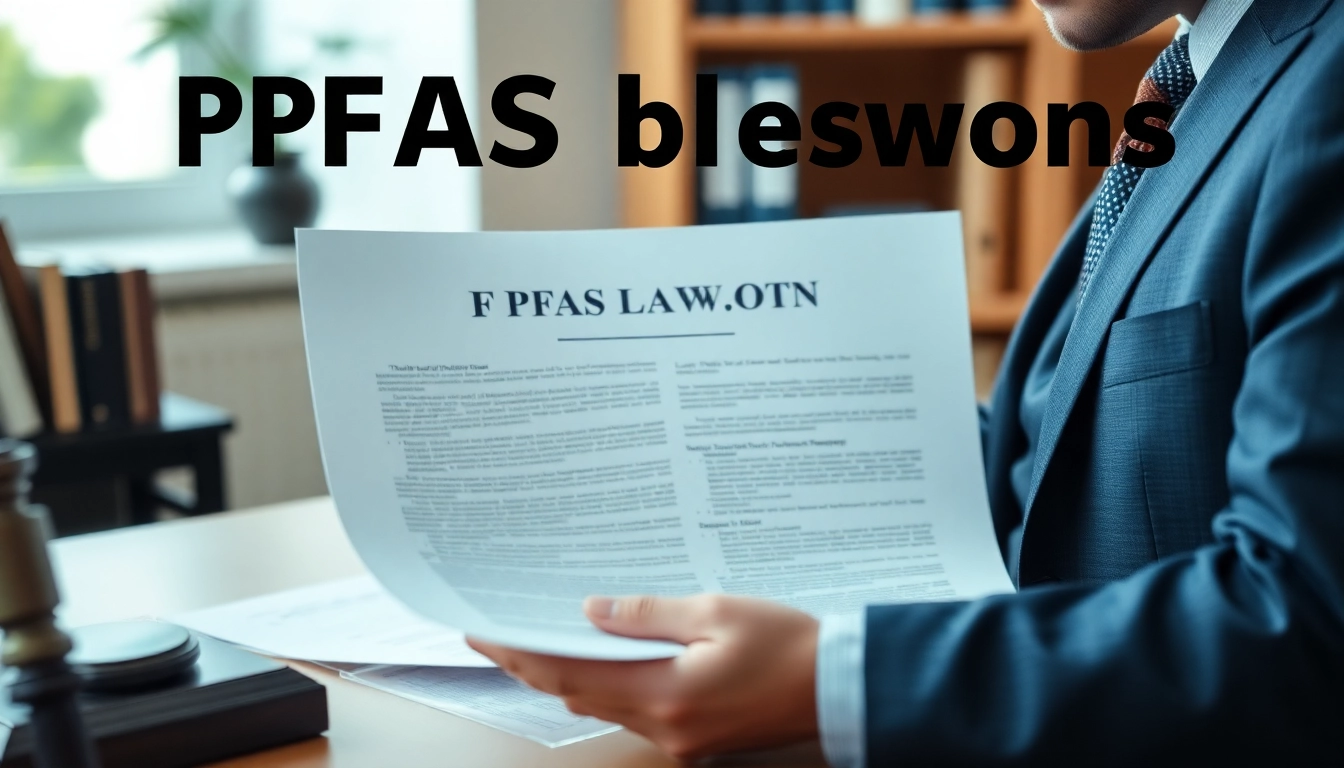Top PFAS Lawsuit Attorneys: Your Guide to Legal Representation and Compensation

Understanding PFAS and Their Impact
What Are PFAS?
Per- and polyfluoroalkyl substances (PFAS) are a group of synthetic chemicals that have been widely utilized in various industries since the 1940s. Renowned for their water- and grease-resistant properties, PFAS are commonly found in products such as nonstick cookware, waterproof clothing, food packaging, and firefighting foam. Due to their structural composition, PFAS are often referred to as “forever chemicals,” highlighting their persistence in the environment and human body. Their resistance to breakdown poses severe challenges for environmental health, as these chemicals can accumulate over time, leading to widespread contamination.
The Health Risks Associated with PFAS Exposure
Scientific research has indicated significant health risks associated with PFAS exposure. Studies reveal a potential correlation between these chemicals and a range of adverse health outcomes, including:
- Cancer: Elevated levels of PFAS in the bloodstream have been linked to various cancers, including testicular and kidney cancer.
- Hormonal Disruption: PFAS can interfere with endocrine functions, potentially leading to reproductive issues and developmental delays in children.
- Immune System Effects: There is evidence suggesting that PFAS exposure may weaken the immune response, making individuals more susceptible to infections and reducing vaccine efficacy.
- Cholesterol Levels: Studies have indicated that exposure to PFAS may result in increased cholesterol levels, which can lead to heart disease.
Given these health implications, the necessity for legal action against companies responsible for PFAS contamination has become increasingly critical.
Current Status of PFAS Regulations
As awareness of the dangers of PFAS has grown, regulatory measures have begun to evolve, though progress has been slow. Currently, the Environmental Protection Agency (EPA) is in the process of establishing stricter regulations regarding PFAS in drinking water and other environmental contexts. The agency has proposed to designate certain PFAS compounds as hazardous substances under the Comprehensive Environmental Response, Compensation, and Liability Act (CERCLA).
However, varying regulations at state levels can create a complex landscape for individuals affected by PFAS exposure. Some states have implemented stringent drinking water standards and cleanup guidelines, while others have yet to establish comprehensive regulations. This disparity underscores the importance of having knowledgeable PFAS lawsuit attorneys who can navigate the legal system effectively on behalf of affected individuals.
Why You Need PFAS Lawsuit Attorneys
The Role of Attorneys in PFAS Cases
PFAS lawsuit attorneys play a vital role in the legal landscape regarding toxic exposure cases. Their expertise is essential for several reasons:
- Legal Knowledge: Attorneys specializing in PFAS lawsuits understand the complexities involved in these cases, including the nuances of environmental law and toxic tort claims.
- Evidence Collection: Skilled attorneys can assist clients in gathering necessary evidence, including medical records, scientific studies, and expert testimonies to build a robust case.
- Negotiating Settlements: Experienced attorneys are adept negotiators and can seek fair compensation by negotiating settlements with responsible parties, saving clients time and stress.
- Trial Representation: If a case goes to trial, having an attorney familiar with PFAS litigation can significantly impact the outcome.
Common Legal Strategies Used by PFAS Attorneys
PFAS lawsuit attorneys employ a variety of legal strategies tailored to each case’s specifics. Some common strategies include:
- Class Action Lawsuits: In cases where numerous individuals have been affected by PFAS contamination, attorneys may file class action lawsuits, allowing a group of affected parties to seek justice collectively.
- Negligence Claims: Attorneys may argue that companies failed to exercise a reasonable duty of care in managing PFAS products, leading to public harm.
- Strict Liability: Some lawsuits are built on the principle of strict liability, meaning that companies can be held responsible for harm caused by their products, regardless of their intent or negligence.
- Pursuing Punitive Damages: In cases of egregious misconduct, attorneys may seek punitive damages to penalize the responsible parties beyond compensatory damages.
How to Choose the Right Attorney for Your PFAS Case
Selecting the right attorney for your PFAS case can be pivotal in ensuring successful outcomes. Here are key considerations in making this choice:
- Experience: Look for attorneys with specific experience handling PFAS litigation or environmental toxic torts.
- Track Record: Evaluate the attorney’s history of successful settlements and verdicts in similar cases.
- Client Reviews: Reading testimonials and reviews can provide insight into an attorney’s dedication and effectiveness.
- Communication Style: Choose an attorney who communicates clearly and keeps you informed throughout the legal process.
Steps to Filing a PFAS Lawsuit
Initial Consultation with PFAS Lawsuit Attorneys
The first step in filing a PFAS lawsuit is to schedule an initial consultation with an attorney. During this meeting, you will have the opportunity to discuss your situation, learn about your legal rights, and assess whether you have grounds for a lawsuit. Many attorneys offer free consultations to evaluate claims, making it accessible for those affected.
Gathering Evidence for Your Case
Evidence collection is crucial for a successful PFAS lawsuit. Key pieces of evidence may include:
- Medical Records: Documenting health conditions that may be linked to PFAS exposure can serve as crucial evidence.
- Product Documentation: Collecting information on products you used that contain PFAS can substantiate claims.
- Environmental Tests: Results from water, soil, or air testing indicating PFAS contamination can strengthen your case.
- Witness Accounts: Collecting testimonies from others affected or knowledgeable about the contamination can bolster your claim.
What to Expect During the Legal Process
The legal process for a PFAS lawsuit can take time and may involve multiple stages:
- Filing the Complaint: Your attorney will file a legal complaint outlining your case against the responsible parties.
- Discovery Phase: Both parties exchange pertinent information, including documents and witness lists, which may involve depositions of involved parties.
- Negotiation: Before going to trial, parties often enter negotiations to reach a settlement, which the attorney will oversee to ensure fairness.
- Trial: If negotiations fail, the case will proceed to trial, where arguments and evidence will be presented before a jury or judge.
Compensation in PFAS Lawsuits
Types of Damages You Can Claim
In PFAS lawsuits, various types of damages can be pursued, which may include:
- Medical Expenses: Claiming reimbursement for past and future medical costs associated with PFAS exposure.
- Pain and Suffering: Seeking compensation for physical and emotional distress endured due to health issues.
- Lost Wages: Recovering lost income due to inability to work as a result of PFAS-related health conditions.
- Property Damage: If PFAS contamination has affected your property value or quality, you may seek compensation for repairs or loss.
Factors Influencing Compensation Amounts
The compensation amount in PFAS lawsuits can vary widely based on different factors, such as:
- The Severity of Health Issues: More severe health conditions typically result in higher compensation due to increased medical costs and suffering.
- Evidence Quality: Stronger evidence supporting the link between PFAS exposure and health problems can significantly influence the outcome.
- Defendant’s Financial Resources: The financial capacity of the responsible parties may impact the settlement or judgment amounts.
- Legal Precedents: Previous verdicts in similar cases can establish benchmarks for compensation amounts.
Testimonials from Successful PFAS Lawsuit Cases
Hearing from individuals who have successfully navigated PFAS lawsuits can provide insight and hope for those considering legal action. Here are a few testimonials:
“I was diagnosed with serious health issues linked to PFAS exposure from nearby contaminated water. My attorney fought diligently for my case, and I received compensation that helped cover medical costs and allowed me to focus on recovery.” – Sarah D.
“After years of struggling with anxiety and health problems, I discovered that my symptoms were related to PFAS. With the support of a dedicated attorney, I was able to secure a settlement that changed my life for the better.” – Mike T.
Finding the Best PFAS Lawsuit Attorneys
Researching Expert Attorneys in Your Area
Finding an adept PFAS lawsuit attorney begins with thorough research. Consider the following methods:
- Online Directories: Utilize legal directories to find attorneys specializing in environmental and toxic tort law.
- Referrals: Seek recommendations from friends or family members who may have had similar legal issues.
- Local Bar Associations: Contacting your local bar association can provide valuable information on attorneys who specialize in PFAS cases.
Common Questions to Ask Potential Attorneys
When interviewing potential attorneys, asking the right questions can help gauge their suitability for your case:
- What is your experience with PFAS lawsuits?
- Can you explain your fee structure?
- What is your track record with similar cases?
- How do you communicate with clients throughout the process?
Understanding Attorney Fees and Payment Structures
Legal fees in PFAS lawsuits can vary significantly based on various structures:
- Contingency Fees: Many PFAS attorneys work on a contingency fee basis, meaning they only get paid if you win your case, typically receiving a percentage of the settlement.
- Hourly Rates: Some attorneys may charge hourly rates, which requires upfront payment regardless of case outcome.
- Retainer Fees: Some lawyers may require retainer fees to cover initial work, with subsequent billing based on the time spent on your case.




